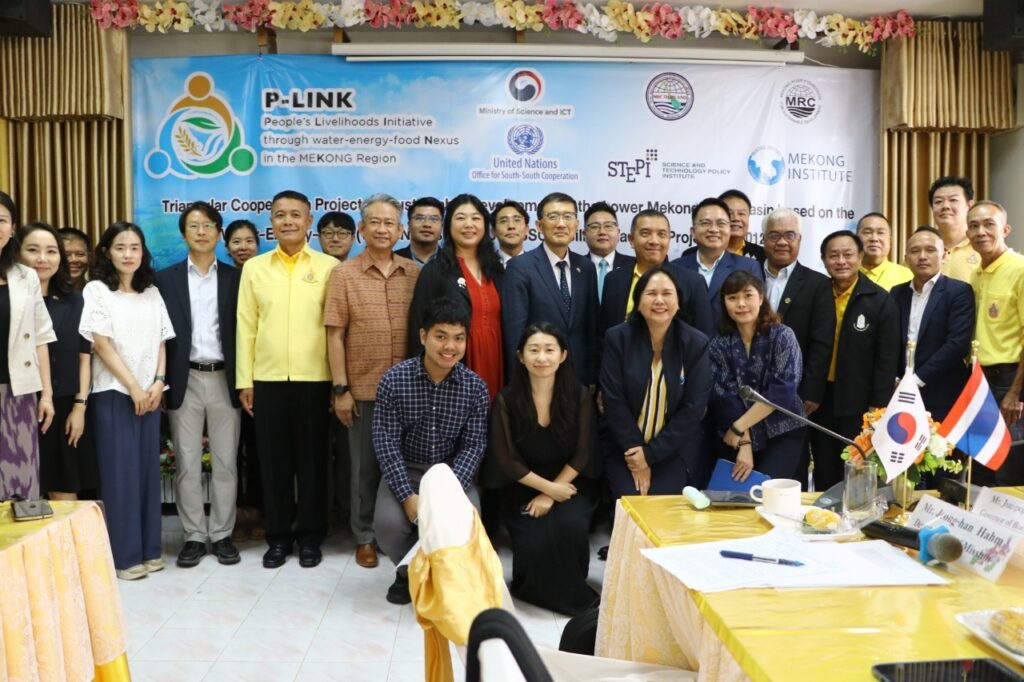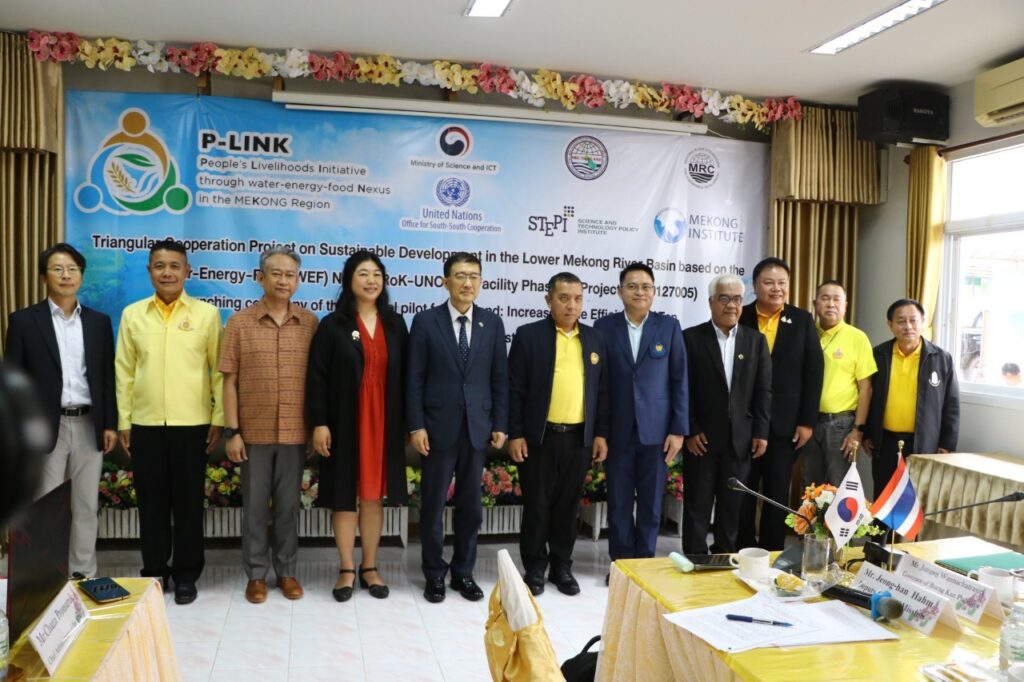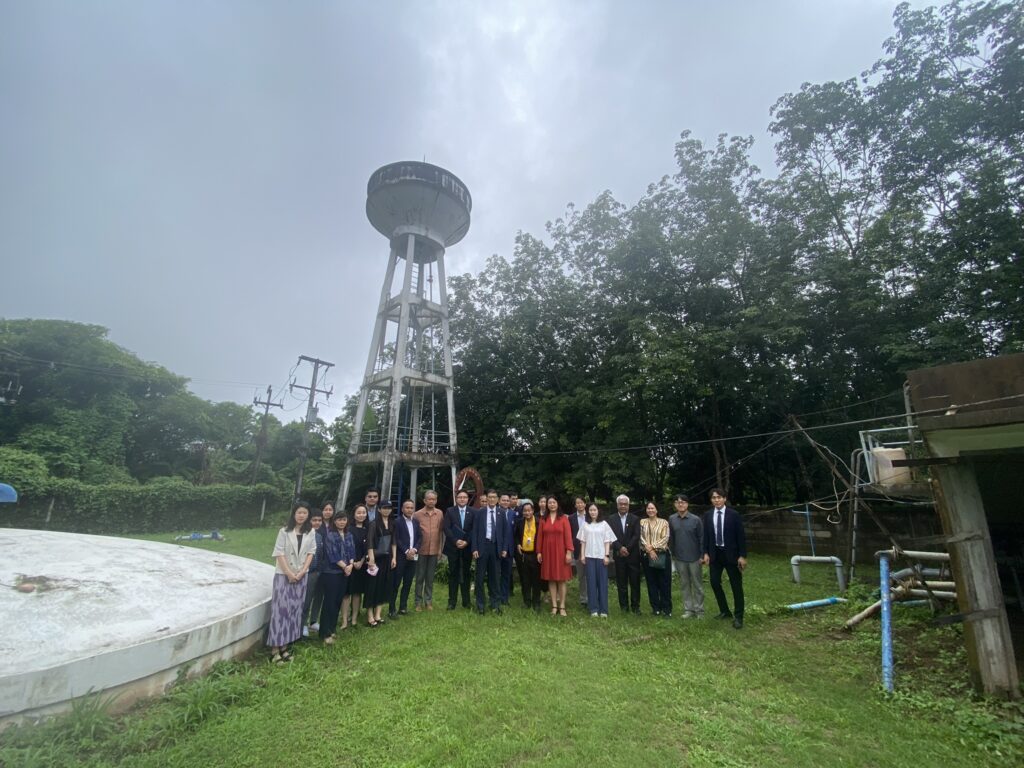Bueng Kan, Thailand: On July 1, 2024, a significant ceremony marked the inception of the “Intelligent Water System Model for Bung Khla District”. This initiative aims to improve water efficient and quality for household usage in communities at Bueng Kan Province, Thailand. The pilot launch event was co-organized by Thailand’s Office of Water Resources (ONWR), Thai National Mekong Committee Secretariat (TNMCS), the Mekong River Commission Secretariat (MRCS), and the UN Office for South-South Cooperation (UNOSSC), representing a major advancement in integrated water management.
A Collaborative Effort for Sustainable Development
This initiative is part of the broader collaborative project titled “Triangular Cooperation on Sustainable Development in the Lower Mekong Basin based on the Water-Energy-Food (WEF) Nexus.” This project, also known as “RoK-UNOSSC Facility Phase 3” and P-LINK, is a joint effort between UNOSSC, the Republic of Korea (ROK)’s Ministry of Science and ICT (MSIT), and the Mekong River Commission (MRC). Its goal is to enhance access to water, food, and energy for vulnerable communities across Cambodia, Lao PDR, Thailand, and Vietnam through innovative and integrated approaches.
Objectives and Implementation
The Thai pilot project aims to address issues related to water leakage, energy efficiency, water quality, and service delivery within the water supply system through the use of digital technologies. Over the course of 16 months, the project will:
- Provide Advisory Services: Conduct a comprehensive water system assessment and validate GIS data to design a customized water monitoring system.
- Implement Advanced Systems: Build a Supervisory Control and Data Acquisition (SCADA) system and monitoring center, implement an Intelligent Water Loss Management System, install IoT devices for water leak detection, and establish a smart water billing system.
- Facilitate Capacity Building: Offer training and knowledge-sharing sessions on water loss prevention, energy efficiency, and water service improvements to ensure local ownership and sustainability.
- WI.Plat, a technology company from the Republic of Korea specializing in smart water management, will lead the technical transfer and capacity-building efforts.
Inception Ceremony Highlights

Over 60 representatives from various ministries, public institutions, local governments, intergovernmental organizations and media attended the ceremony. Key speakers included:
- Jumpoj Wannachatrasiri, Governor of Bueng Kan Province, expressed sincere gratitude to the Republic of Korea and the project for designing and implementing a practical and innovative project to enhance people of Beung Kan. The local government stands ready to spearhead the project.
- Naris Athan, President of Bung Khla Subdistrict Administrative Organization, assured the local government and communities’ commitment and ownership of the project as demonstrated in their in-kind contribution, with high expectations that the applied technology and capacity building will allow improved water access and management, resulting in inspiring changes in people’s livelihoods. The local government aspires to become a champion on intelligent water management through P-LINK, and replicate the good practices to other localities.
- Jeong-han Hahm, Deputy Chief of Mission, ROK Embassy in Thailand highlighted that the project’s integrated approaches are instrumental in fostering sustainable development, particularly in the areas of environment, technology innovation, and sustainable resource management that are priority areas of cooperation outlined in the “Plan of Action 2021-2025 under the Mekong-ROK Cooperation framework. He also underscored ROK’s commitment to advance mutually beneficial and substantive collaboration with Mekong countries aligned with “Korea-ASEAN Solidarity Initiative” (KASI) and “Indo-Pacific Strategy”.
- Xiaojun Grace Wang, UNOSSC Trust Fund Director, highlighted the value of triangular cooperation in delivering impactful results. She hopes that the applied solutions and capacity-building efforts can be replicated in other areas and showcased as best practices in line with the Sufficient Economy Philosophy (SEP).
- Sunghoon Hwang, Director General of MSIT, who commended the project’s comprehensive approach and wished that ROK’s the pilot to deliver meaning and tangible results by harnessing digital solutions to enhance livelihoods of the Mekong communities.

Discussions and Future Plans
Participants discussed challenges related to water, energy, and food management in Thailand, the role of Science, Technology, and Innovation (STI) in the WEF Nexus approach, and shared experiences and best practices from the country, Lao PDR and the ROK. They also highlighted the benefits of South-South and Triangular Cooperation (SS & TrC) in technical transfer and knowledge sharing.
Site Visit to the project site
Prior to the official launch ceremony, the participant also paid a visit to water supply and treatment facilities at the pilot site to observe and better understand the local situation, which will help the project stakeholders to witness the inspiring stories by the community after the implementation of the pilot.

Project stakeholders at local water treatment facility
Looking Ahead
National pilots for Cambodia, Lao PDR, and Vietnam are also underway. The Lao pilot’s inception ceremony was held in June. Cambodia and Viet Nam will convene with their launch events scheduled for August 2024. This project represents a significant step towards sustainable development in the Lower Mekong Basin, promising improved livelihoods and resilience for the region’s communities.
